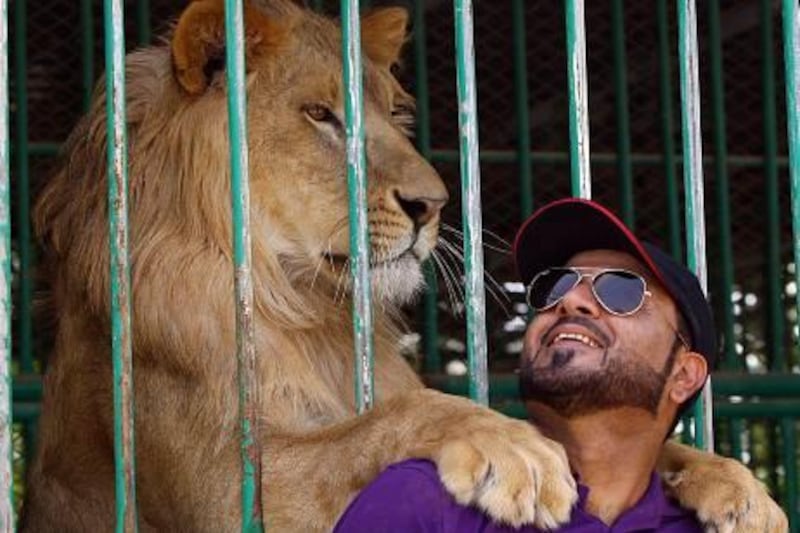RAS AL KHAIMAH // Tao was kept in a tiny cage and starved for the first nine months of his life.
As a result, he has a hunched back, a limp leg and permanent shackle marks where his legs were bound.
The two-year-old lion would probably have been put down if it were not for the Dr Doolittle of Ras Al Khaimah.
Tao is now "the friendliest lion" at Ras Al Khaimah Wildlife Park, said Jasim Ali Salim, an Emirati trader who began collecting unwanted wild animals from local families 15 years ago.
"He was extremely wild and ferocious when we first got him, you can see even his hair growth is irregular. But by God's grace in one month he was tamed," he said. "People have laughed at me when I told them that I can communicate with animals. But I understand the body language of lions and the roars and groans they make and, accordingly, I act."
Mr Salim's two-acre plot in Awafi is home to more 20 different species, including an Arabian wolf, lions, leopards, hyenas, baboons, snakes, a Nile crocodile and an assortment of wild cats from Asian, African and Arabian origins.
"People keep these animals as a sign of pride or to show off," he said. "They do not realise that when they grow they become more ferocious and dangerous.
"Zoos and reserves also refuse these animals because most of them do not have proper documents but I will accept any neglected wild animal and I refuse to trade in them." Mr Salim is not a vet and has never studied animal handling.
"This ability has come to me because of my love of wild creatures," he said.
This love is evident in the amount he invests in his menagerie - Dh300,000 a year is spent on the animals' food, while a further Dh20,000 a month goes to their upkeep and care.
Mr Salim, 40, a father of four, set up the wildlife park in 2010.
"The RAK government has been very supportive of us and granted us all the licences and necessary permits to set up the zoo," he said.
"The animals are handled by staff that I have hired and are checked regularly by contracted veterinarians."
The zoo has been a big hit with local residents. Ali Abdullah, a teacher in North Thait, brings his pupils to the park.
"Before, I had to take my children to Sharjah and Dubai to see wild animals and learn about them," he said. "Since the launch of the zoo two years ago more than 25,000 people have visited and it has become one of our regular tourist attractions."
Wildlife expert Dr Reza Ali Khan also applauded Mr Salim's efforts.
"This is a wonderful thing that he is doing and if proper care is being provided for these animals I welcome that," he said.
Dr Khan said the trend of keeping wild animals as pets had died down since the 1980s but has picked up again in recent years. "We have seen several cases come up in the past few years where people have kept these wild cats in their homes as pets and this is extremely dangerous."
Mr Salim also has strong words for those who bring wild animals into the UAE. "People who trade in these animals are the ones who should be stopped," he said. "It is completely illegal."
He has been in contact with many local and international animal welfare societies who are able to help him to reintegrate some of the animals back into the wild.
"Some of them cannot be tamed and can survive back in the wild - like the black panther or the wild cheetah - but others have to be rehabilitated and trained before they go back," he said.






